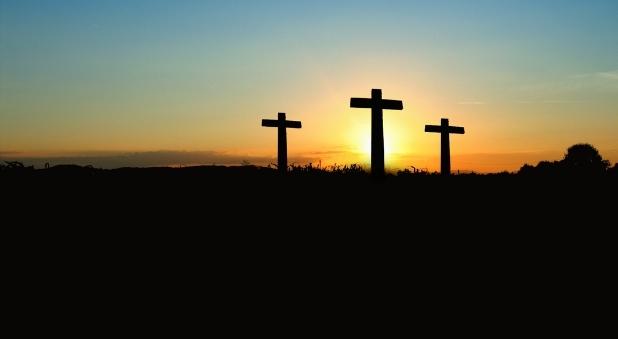As we prepare to celebrate the death and resurrection of Jesus at Easter this year, we are conscious in a fresh and striking way of the need of the world for the forgiveness, judgement and healing that lie at the heart of the Cross of Christ. We feel deeply the injustice of the war against Ukraine and cry out for vindication for the innocent oppressed and judgement on wicked aggression.
In 1989 Vladimir Putin was a KGB officer in what was then known as East Berlin. At the time, the Berlin Wall had stood for nearly 30 years of the Cold War, a grim dividing line between the Communist East and the democratic West. It didn’t just separate different ideologies and political systems but, most painfully of all, it divided families and loved ones as well.
If you’re as old as me you might remember the Berlin Wall coming down in November 1989. It was a day of joy and freedom and reunion for the people of that once divided city.
I remember watching the events unfold on television and you didn’t have to imagine the feelings of East Berliners and West Berliners as they crossed back and forth. They were overjoyed! They were bursting with happiness because, in a moment, they had moved from separation to reunion, from estrangement to fellowship, from hostility to reconciliation.
In the four gospel accounts of the death of Jesus Christ we have recorded for us seven statements made by the Lord before he died. In Mark’s Gospel just one of those seven statements appears. It’s in the language that Jesus spoke, Aramaic, but Mark translates it for us:
“My God, my God, why have you forsaken me?” (Mark 15:34)
Forsaken means cut off, abandoned, rejected. Jesus, who always lived in the presence and pleasure of God his Father, experiences abandonment, rejection, God-forsakenness on the Cross. Mark records further detail to explain what is going on:
With a loud cry, Jesus breathed his last. The curtain in the temple was torn in two from top to bottom (Mark 15:37-38)
The temple was the cornerstone of the old religion. There was no access to God but by his temple, there was no experience of God apart from the temple, there was no peace with God without the temple.
The temple curtain that was many layers deep and stretched metres from ceiling to floor put out the signal, loud and clear, that the God who is holy and pure, almighty and majestic, cannot be approached by anyone or anything that is imperfect, unholy, unclean and impure. The curtain stood as a stark reminder that no one and nothing that is not perfect in God’s sight can approach him.
But when Jesus died the curtain was suddenly and dramatically torn in two. As Jesus died the curtain, the wall of separation – the grim barrier between us and God – came down, was torn in two and done away with.
Invited in
Jesus on the Cross was forsaken by God. But this happened so that flawed and imperfect people like you and me could be welcomed into God’s presence. As Jesus on the Cross was shut out, an undeserving world was invited in.
Jesus experienced the banishment we deserved; we experience the welcome that he deserves. His death on the Cross is our way in to life with God; he was forsaken, we are welcomed.
As the writer to the Hebrews puts it: we have confidence to enter the Most Holy Place by the blood of Jesus, by a new and living way opened for us through the curtain, that is, his body (Hebrews 10:19-20)
In the death and resurrection of Jesus, God has judged the sin of the world – our sin – and brought down “the dividing wall of hostility” (Ephesians 2:14) that separates people from God, and from each other.
This Easter, as on so many occasions in the past, we cry out to God for peace between nations. War ravages Ukraine, Yemen, Myanmar, Nigeria, Tigray, South Sudan and the list goes on. God will not tolerate the sinfulness of humans forever. By his Cross, he has given testimony to judgement on sin, and wonderfully, mercifully, opened a way to forgiveness, cleansing and hope.
As we rejoice in the gift of Easter this year, please join me in praying for all those who suffer in wars not of their own making, that they may know the comfort and sustaining of the Lord Jesus. Let us pray that the efforts of those who seek peace would prosper, and that the gospel may be made known in war-torn lands – announcing peace with God that endures forever and issues from the indestructible love and hope held out to the world in Jesus’ death and resurrection.






















